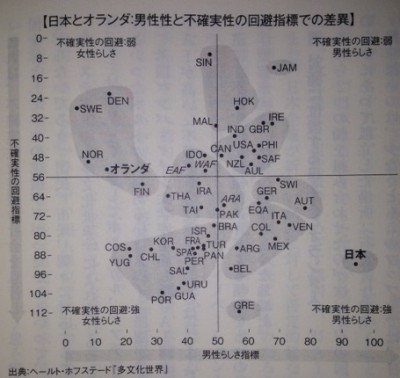I read a book.
“Happy small country, the wisdom of Netherland” (Noboru Kanno, PHP 2012)
It is written that Japan is “very paternal and poor at facing uncertainty.”
Also an interesting data attached,
which is a 2-axis figure showing “Paternal index” and “Uncertainty avoidance index.”
Inside 50 countries, Japan took the first position in paternal index and ranked 7th for uncertainty avoidance index.
スポンサーリンク
Hmmm…….
In my 8-year living experience in Japan, I’ll say “Exactly!” as a foreigner.
Usually, males have to earn money for his family and females tend to quit their jobs while they get married or have a baby to take care of their house works and kids as a full-time house wife.
Well, that’s just what I see every day.
For example,
In morning rush-hour trains, very few married (30~60 year-old) females were there.
80% of people inside shopping malls or parks in weekday afternoon are 30~60 year-old females.
The percentage of public-listed companies without female managers is around 40%! (quoted from this book)
There are even “Female short-term (2 years) colleges” existing in Japan, which are specialized for girls who tends to be house wifes.
Why the feature of paternal society in Japan change so slow even in such a drastically moving global environment?
I got several reasons in my personal experience.
・Laws are not well or effectively constructed yet.
・Males are not trying to face the diversifying environment.
・Females are not trying to be the center of the society.
Continue……


